Lexi Revellian's Blog, page 10
November 4, 2013
Do not trifle with readers' expectations
 A couple of weeks ago Harper Collins published the third and final book, Allegiant, in Veronica Roth's popular trilogy. I'd actually bought a copy of the first book, Divergent, and got several chapters in when a horrible certainty came to me that Roth had sold the book as "Harry Potter meets The Hunger Games," and I went right off it.
A couple of weeks ago Harper Collins published the third and final book, Allegiant, in Veronica Roth's popular trilogy. I'd actually bought a copy of the first book, Divergent, and got several chapters in when a horrible certainty came to me that Roth had sold the book as "Harry Potter meets The Hunger Games," and I went right off it.Currently Allegiant is at number 5 in the UK Kindle Store; it has 2,040 reviews with an average of 2.8 stars. Why the huge sales and the low customer ratings? Because Veronica Roth chose to end the series in a way that her readers hated. Here is a typical comment:
"I loved Divergent and Insurgent and was really looking forward to Allegiant. I don't recommend this book to anyone unless you want to be distraught and depressed for days afterwards. The first 300 pages are boring and totally detached from the plot of the first two books. The book picks up in the end only to leave the readers broken-hearted. There is no happy ending. There is no real closure. The author can do anything she wants with the final book and needless to say, I really dislike Veronica Roth as an author after reading this. Why end a once epic trilogy this way? I read books to be entertained and I was far from entertained. I recommend readers only reading the first two books and making up their own ending."
There is a compact between writers and readers; the reader will suspend disbelief, the writer will be true to the characters and the genre. How would we feel if Bertie Wooster suddenly murdered his Aunt Agatha? We would feel indignant and cheated, just like Roth's fans. I think there is an urge successful writers sometimes have to demonstrate they are really serious artists, prepared to shock and confound expectations. Doing this is generally a mistake.
It happens with screen writers, too. I still remember the final episode of MASH, where the writers, assured of a vast audience, decided to go all serious. Then there's the episode of Cheers where Sam discovers the dishy young woman accompanying an old friend is not his girlfriend but his daughter, and feels old and alone. This glum stuff is not what we watch Cheers for - we want to be amused, that's all.
It's difficult enough to write a good book without being wilful. Don't be wilful. Readers will not forgive you.
Published on November 04, 2013 10:33
October 19, 2013
Writers' & Artists' Yearbook, farewell and good riddance
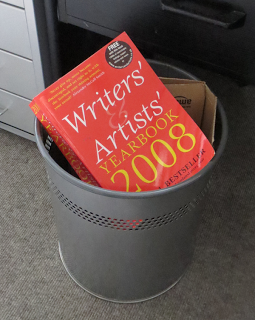 I last thought it essential to possess a copy of Writers' & Artists' Yearbook in 2008. I was no doubt happy to hand over my £14.99 for their 101st edition, believing this was a step towards becoming a published author. Flicking through it now, it strikes me as all rather quaint.
I last thought it essential to possess a copy of Writers' & Artists' Yearbook in 2008. I was no doubt happy to hand over my £14.99 for their 101st edition, believing this was a step towards becoming a published author. Flicking through it now, it strikes me as all rather quaint.Here's Alison Baverstock, writing a piece on How to attract the attention of a literary agent: "Think not what an agent can do for you, but what you can do for an agent", which is the exact opposite of my advice of what to ask an interested agent: "What can you do for me?" There's all the usual stuff about doing your research, meekly sending exactly what the agent wants, and waiting patiently and not bothering her as the months trail by. It's not called submission for nothing.
Little mention, in 2008, of self-publishing; one article mentions POD, with no suggestions as to how a writer can sell the books once they are printed.
In my copy I see I've turned down corners, crossed out non-fiction agents, and put lines and stars by the possibilities. So much hope: such a complete waste of time, effort, stationery, ink cartridges and stamps.
These days, Writers' & Artists' recognizes that a huge chunk of publishing is self-publishing, and have even got a section offering would-be indie authors advice. Unfortunately they, like most of the large publishers, have done a deal with the devil, Author Solutions (now owned by Random Penguin). A new writer filling in their handy form is very likely to be recommended to use one of the 'self-publishing services' of Author Solutions or one of their alter egos. He will then find himself subjected to a hard sell, and paying thousands of pounds for inferior and useless 'services' he doesn't need or could get cheaply elsewhere. He will end up sadder, wiser, and considerably poorer.
For more detail on W & A's perfidy, see David Gaughran, here.
And my old copy of Writers' & Artists' Yearbook 2008 is going in the bin where it belongs.
Published on October 19, 2013 09:32
October 13, 2013
The WIP's progress: 60,000 words
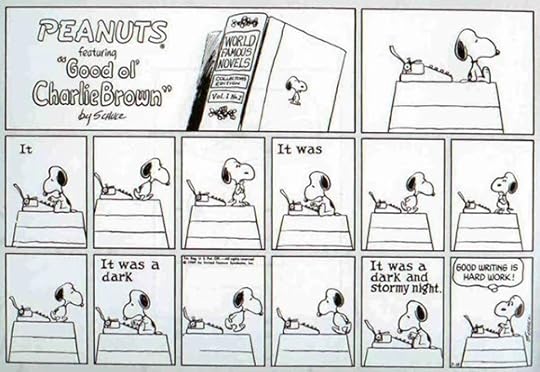
Those of you who hang on my every word (and I don't want to sound ungrateful, but shouldn't you get out more?) will have noticed my blog posts have been a tad less frequent of late. The reason is that in my spare time I've been working on my next novel to the exclusion of much else.
And today I hit the magic 60,000 word mark, which is my personal point of no return. It's not that all is plain sailing from here to the end of the book; I haven't written the end yet and I'm going to have to change some of what I've already written. It's just that if I get that far, barring accidents and disasters, I'm going to finish the darned thing whatever problems I encounter.
Because it's a lot of work, attempting to pick the right 60,000 words and get them in the right order.
Published on October 13, 2013 06:23
September 30, 2013
One word after another
 For me these days the most difficult part of writing a novel is getting going on the first page. I don't recall having this problem with my first two novels, when I was still in the drunken woohoo isn't writing amazing stage. Now just deciding which novel to write can take me months.
For me these days the most difficult part of writing a novel is getting going on the first page. I don't recall having this problem with my first two novels, when I was still in the drunken woohoo isn't writing amazing stage. Now just deciding which novel to write can take me months.With the WIP, I finally cracked it by taking the excellent advice of Jerry Cleaver in his book, Immediate Fiction . You commit five minutes a day to your novel; you also think about it before you go to sleep. And if you don't know what to write, that's fine, you just sit and do nothing for five minutes. If you want to work for longer, that's fine too. You do this religiously for thirty days without evaluating the plan's effectiveness.
I think this method works so well because it gets the subconscious working on the book - and it's totally unthreatening. Anyone, no matter how busy, can find five minutes a day and do nothing. After thirty days I'd got a pile of notes and the novel was under way. My average word count is 480 per day, and the end is in view.
When you get right down to it, writing a novel is as simple as taking the White King's advice in Alice's Adventures in Wonderland:
The White Rabbit put on his spectacles. "Where shall I begin, please, your Majesty?" he asked.
"Begin at the beginning," the King said gravely, "and go on till you come to the end: then stop."
Published on September 30, 2013 06:36
September 25, 2013
Smells in novels ~ but not much in Jane Austen
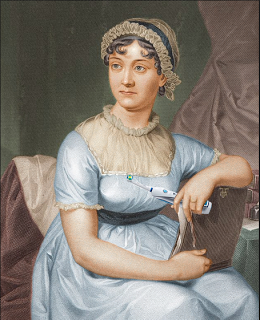 Smell is one of the senses we are told to use when writing a novel, and I totally agree; what can be more evocative than the smell of the sea, or honeysuckle, or a sudden whiff of the aftershave used by a long-departed boyfriend? But in the middle of the night when I should have been sleeping I had a revelation - there are very few mentions of what things smell like in Jane Austen's novels. This from Emma is par for the course:
Smell is one of the senses we are told to use when writing a novel, and I totally agree; what can be more evocative than the smell of the sea, or honeysuckle, or a sudden whiff of the aftershave used by a long-departed boyfriend? But in the middle of the night when I should have been sleeping I had a revelation - there are very few mentions of what things smell like in Jane Austen's novels. This from Emma is par for the course:Never had the exquisite sight, smell, sensation of nature, tranquil, warm, and brilliant after a storm, been more attractive to her.
There must be a reason for this. Smells must have been very different in Jane Austen's day, and I wonder if it was not thought genteel to comment on them.
We are somewhat smug these days about smell - after all, London smells of cars, a mixture of exhaust, tyre particles and petrol, and before owners were compelled to pick up after their dogs, on a hot day Hyde Park had a distinct reek of dog excrement. When my daughter was small I remember constantly trying to stop her accidentally treading in it on the pavement. My workshop is in Hoxton, an area with a vibrant nightlife, and while women seem able to wait to get home to have a pee, many men don't. But it's unarguable that we wash more than the people in Regency times, simply because it's much easier for us to keep clean with running hot water, soap, shampoo, toothpaste, electric toothbrushes and deodorant. So when Jane Austen describes a ball, we can only imagine the smells as the room got warmer and dancers more heated. She is not going to mention them.
How fortunate for us we live in less correct times and are allowed to describe everything our senses record. Any writers reading this are welcome to post a brief extract from their novels that deals with smells, nice or nasty.
Published on September 25, 2013 03:56
September 11, 2013
Writing middles, Clippit, and increasing eccentricity
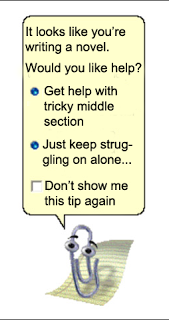 I use Word 2000. It's what I'm used to; I've written five novels on it. I actually uninstalled Word 2007 from my laptop to stick with what I know. (Unadventurous? Moi?)
I use Word 2000. It's what I'm used to; I've written five novels on it. I actually uninstalled Word 2007 from my laptop to stick with what I know. (Unadventurous? Moi?) And one benefit you don't get on modern versions of Word or fancy programs like Scrivener is the Office Assistant. I like Clippit. There, I've said it. I know he has enemies, but it's a lonely business, writing a novel, and you do tend to go a bit mad. (Okay, maybe it's just me. You're probably as sane as when you started.) But I am soothed by Clippit's friendly, helpful presence. Even when I've been staring so long at a blank screen that he curls up and goes to sleep, a silent comment on my lack of productivity, I know at the tap of a key he will spring to attention, ready to make suggestions, my little virtual friend.
In Muriel Spark's novel, A Far Cry From Kensington , it is suggested by the protagonist who works in publishing that a cat is an aid to writing - though she does add, a cat won't actually write the book for you, or guarantee it will be any good. Clippit serves the same function, but you don't have to feed him and take him to the vet, and if you find you are arguing with him more than seems reasonable, you can always switch him off for a while.
Published on September 11, 2013 03:50
September 6, 2013
Writing - never mind the quality, feel the width
 Lucie Rie conical bowl, 1978I want to start with a quote from Evelyn Waugh's Decline and Fall. In this bit Paul Pennyfeather is having problems with discipline as a teacher in his first class at a ghastly school. Another teacher, a child molester called Captain Grimes, gives him a cane and leaves him to it.
Lucie Rie conical bowl, 1978I want to start with a quote from Evelyn Waugh's Decline and Fall. In this bit Paul Pennyfeather is having problems with discipline as a teacher in his first class at a ghastly school. Another teacher, a child molester called Captain Grimes, gives him a cane and leaves him to it."Listen," he said. "I don't care a damn what any of you are called, but if there's another word from anyone I shall keep you all in this afternoon."
"You can't keep me in," said Clutterbuck; "I'm going for a walk with Captain Grimes."
"Then I shall very nearly kill you with this stick. Meanwhile you will all write an essay on 'Self-indulgence'. There will be a prize of half a crown for the longest essay, irrespective of any possible merit."
From then onwards all was silence until break. Paul, still holding his stick, gazed despondently out of the window. Now and then there rose from below the shrill voices of the servants scolding each other in Welsh. By the time the bell rang Clutterbuck had covered sixteen pages, and was awarded the half-crown.
"Did you find those boys difficult to manage?" asked Mr Prendergast, filling his pipe.
"Not at all," said Paul.
Apart from its refreshing lack of political correctness of any kind, this extract contains a writing tip: stop trying so hard and just get on with it. Even if no one is offering you a half crown.
In Art and Fear , Ted Orland and David Bayles tell the story of a ceramics teacher who told his class that half of them would be graded on the quantity of pots they created and the other half on the quality. At the end of the term, the results were interesting. Freed from the pressure of straining for excellence, making good and bad pots, practising and learning from their mistakes, it was the quantity group who produced the best pots.
Published on September 06, 2013 09:48
August 24, 2013
How to get a publishing contract
What are the publishable classes? It's an expression coined by my virtual friend, Iain Manson, and means the sort of people who find it relatively easy to get an agent and a publishing deal, unlike most of us who find it next to impossible. It includes (and I'm relying on Iain to tell me if I've missed a category):
JournalistsAnyone with a contact in publishingAnyone famous for something other than writingAnyone related to someone famousRecent examples include 21 year-old Samantha Shannon; from the Guardian article: "Her father knew someone in touch with literary agent David Godwin and, after an email exchange, he agreed to look at her manuscript. He was 'kind' about it but also turned the book down. Yet it was this connection that would not long afterwards lead to Shannon doing a two-week summer internship with his agency (in Seven Dials, Covent Garden), which was to prove illuminating about 'how the industry works'." David Godwin subsequently became her agent and sold the first three novels in her fantasy series to Bloomsbury for a six-figure sum.
Lottie Moggach is doubly qualified by being a journalist and daughter of Deborah Moggach, the successful writer. Her first novel, Kiss Me First, has recently been published by Picador.
Then there's promising newcomer JK Galbraith, who turned out to have got a deal for his first crime novel by actually being JK Rowling.
I haven't read any of these books, and I'm not implying they are not excellent and worthy of a publishing contract. But I think this nepotism matters, because the pool from which publishers select authors is in reality quite small, however vast the slush pile may be. It seems to me self-evident that there are many equally good or better writers who are rejected time and again after a cursory glance by an intern. And these days when the future of Big Publishing is uncertain, they cannot afford to miss the next Big Thing just because it happens to have been written by a nobody.
P.S. On a happier note, self-publication has again proved the best way to go for most of us. Steve Robinson has accepted an offer from Amazon for a four book deal with an option on book five following the huge popularity of his genealogical crime series, now on special offer. Go Steve!
JournalistsAnyone with a contact in publishingAnyone famous for something other than writingAnyone related to someone famousRecent examples include 21 year-old Samantha Shannon; from the Guardian article: "Her father knew someone in touch with literary agent David Godwin and, after an email exchange, he agreed to look at her manuscript. He was 'kind' about it but also turned the book down. Yet it was this connection that would not long afterwards lead to Shannon doing a two-week summer internship with his agency (in Seven Dials, Covent Garden), which was to prove illuminating about 'how the industry works'." David Godwin subsequently became her agent and sold the first three novels in her fantasy series to Bloomsbury for a six-figure sum.
Lottie Moggach is doubly qualified by being a journalist and daughter of Deborah Moggach, the successful writer. Her first novel, Kiss Me First, has recently been published by Picador.
Then there's promising newcomer JK Galbraith, who turned out to have got a deal for his first crime novel by actually being JK Rowling.
I haven't read any of these books, and I'm not implying they are not excellent and worthy of a publishing contract. But I think this nepotism matters, because the pool from which publishers select authors is in reality quite small, however vast the slush pile may be. It seems to me self-evident that there are many equally good or better writers who are rejected time and again after a cursory glance by an intern. And these days when the future of Big Publishing is uncertain, they cannot afford to miss the next Big Thing just because it happens to have been written by a nobody.
P.S. On a happier note, self-publication has again proved the best way to go for most of us. Steve Robinson has accepted an offer from Amazon for a four book deal with an option on book five following the huge popularity of his genealogical crime series, now on special offer. Go Steve!
Published on August 24, 2013 08:02
August 9, 2013
My 3rd self-publishing anniversary
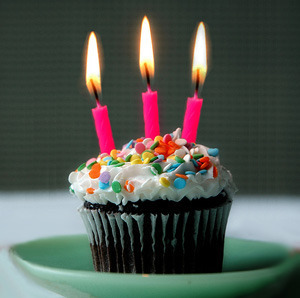 This day three years ago I self-published Remix on Amazon.
This day three years ago I self-published Remix on Amazon.Self-publishing wasn't what I really wanted. I believe I still hankered after the dream - an agent, a publisher, a stack of books in a bookshop which I could go and secretly gloat over, maybe a desk, a pen, a queue of fans...
But the dream had made it clear it didn't want anything to do with me. I couldn't even get to first base and find an agent to take me on, though several trifled with me.
So I gritted the teeth, concocted a cover, worked out how to format for Smashwords and KDP, and committed to the move.
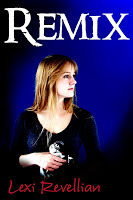 Back then - and how quaint it seems now - writers on forums would give dire warnings that you were using up your first publication rights (que?) and said no big publisher would consider a book once it had been self-published (pause for raucous laughter). They also opined that no book without the input of a publisher's team of editors, designers and marketers would A) be any good and B) sell any copies.
Back then - and how quaint it seems now - writers on forums would give dire warnings that you were using up your first publication rights (que?) and said no big publisher would consider a book once it had been self-published (pause for raucous laughter). They also opined that no book without the input of a publisher's team of editors, designers and marketers would A) be any good and B) sell any copies.How wrong they were. Those of us who jumped in at that point caught the first wave of indie opportunity, a boom time that will never happen again. So favourable to popular books were Amazon's algorithms in those days that Remix spent over eight months in the UK top 100.
Now that almost everyone agrees that self-publishing is a valid way for a writer to proceed, it's way tougher to make an impact on the charts. Three years ago, I was lucky.
Published on August 09, 2013 09:18
July 26, 2013
REMIX, the Hungarian hardback
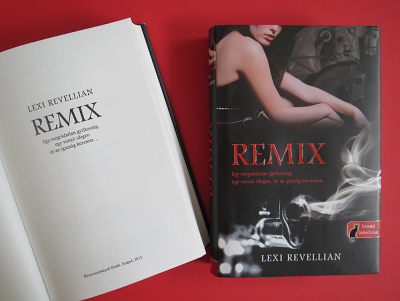
Yesterday the Hungarian hardback edition of Remix arrived through the post. A proud moment. So far, Könyvmolyképző Kiadó's is the only hardback version of any of my novels.
Remix has had quite a few covers in its time, and it's interesting that this one has more the feel of my early ones. The title is in raised lettering. My heroine Caz looks very sultry, which I think would amuse her. I particularly like the dedication:
MintynekKöszönet minden íro somat barátomnak – ti tudjátok, kikre gondolok...
TRANSLATIONFor Minty With thanks to all my writing friends - you know who you are...
Published on July 26, 2013 04:48



